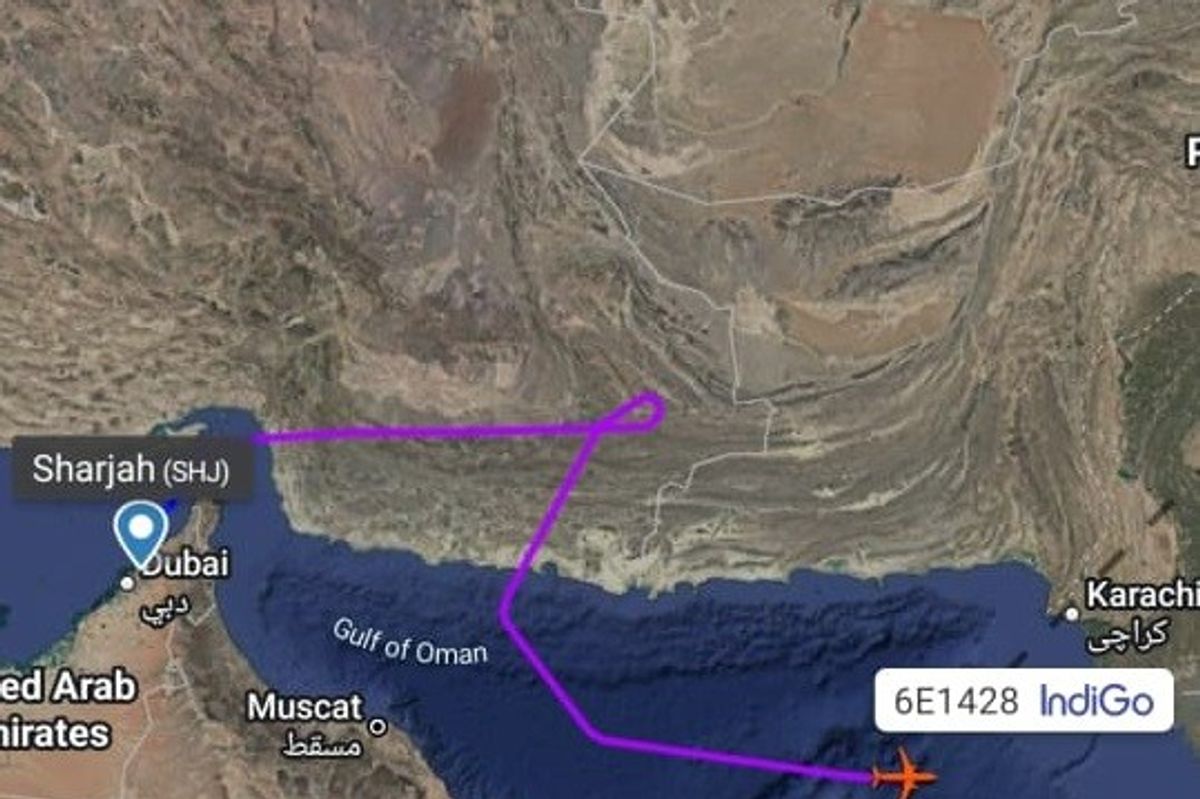Indian airlines face major losses as Pakistan blocks airspace amid Kashmir tensions
Aviation experts warn the impact could rival or exceed the 2019 airspace closure, which cost Indian carriers an estimated $80 million

Aamir Abbasi
Editor, Islamabad
Aamir; a journalist with 15 years of experience, working in Newspaper, TV and Digital Media. Worked in Field, covered Big Legal Constitutional and Political Events in Pakistan since 2009 with Pakistan’s Top Media Organizations. Graduate of Quaid I Azam University Islamabad.

An Indian airliner can be seen taking a longer route avoiding Pakistani airspace to reach its destination.
Flightradar24/Screengrab
Indian airlines are facing mounting financial losses and operational disruptions after Pakistan blocked its airspace, forcing lengthy detours on international routes and triggering widespread flight delays.
Aviation experts warn the impact could rival or exceed the 2019 airspace closure, which cost Indian carriers an estimated $80 million. Flights to and from North America, Europe, and the Middle East are now taking significantly longer routes, increasing fuel costs and straining crew schedules.
“Indian aircraft will now need to fly two to three hours more to reach destinations in Europe and North America,” aviation journalist Tahir Imran said in a post on X. “This will cause huge financial losses, inconvenience passengers, and stretch airline crews due to extended flight times.”
The disruptions began on Thursday, just hours after Pakistan’s National Security Committee met in response to a deadly attack in Indian-administered Kashmir. The attack, which took place in the popular tourist town of Pahalgam, killed 26 people — all Indian nationals except one Nepali — in what Indian officials have called the worst civilian attack in the region in more than two decades.
Soon after the meeting, Pakistan’s Civil Aviation Authority issued a Notice to Airmen (NOTAM) stating: “Pakistan airspace not available for Indian registered aircraft and operated/owned or leased by Indian airlines.”
The decision triggered immediate consequences. Indian passenger aircraft began turning back mid-air before reaching Pakistani airspace. Airlines scrambled to reroute long-haul flights and issued advisories to passengers about delays and extended travel times.
“Due to the announced restriction of Pakistan airspace for all Indian airlines, it is expected that some Air India flights to or from North America, UK, Europe and the Middle East will take an alternative extended route,” Air India said in an update shared on social media.
“Air India regrets the inconvenience caused to our passengers due to this unforeseen airspace closure that is outside our control. We would like to reiterate that at Air India, the safety of our customers and crew remains top priority,” the airline added.
The last time Pakistan closed its airspace to India — after the 2019 Balakot airstrikes — the restriction lasted several months and caused widespread disruption. India’s aviation industry reported losses of over $70 million during that period.
Analysts say the current closure, coming amid already strained operating margins for Indian carriers, could pose a serious challenge. Strategic adjustments and swift contingency planning are now critical to minimize financial harm.
The development comes as diplomatic tensions surge between the nuclear-armed rivals. Following the attack in Pahalgam, India announced the suspension of the Indus Waters Treaty — a key water-sharing agreement between the two countries.
Signed in 1960 and brokered by the World Bank, the treaty has survived multiple wars and crises. Its suspension signals a sharp escalation in hostilities.
India and Pakistan have not maintained full diplomatic ties since 2019, when New Delhi revoked the special status of Jammu and Kashmir. Since then, Pakistan has expelled India’s envoy and has not appointed its own ambassador to New Delhi.
Prime Minister Narendra Modi’s government had touted the 2019 move as a step toward stability and development in the Muslim-majority region. But the latest violence and its fallout have cast renewed doubt on that narrative.
Kashmir has been the center of a decades-long conflict, with some groups seeking independence. Tens of thousands of people have died in the region since the armed uprising began in 1989.







Comments
See what people are discussing